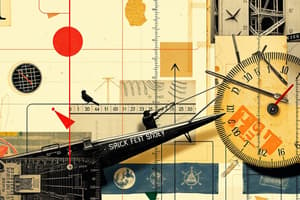Podcast
Questions and Answers
A spoken or written summary of observations is called (BLANK)
A spoken or written summary of observations is called (BLANK)
description
An interpretation of observations is called (BLANK)
An interpretation of observations is called (BLANK)
explanation
The International System of Units is the internationally accepted system of (BLANK)
The International System of Units is the internationally accepted system of (BLANK)
measurement
The seven standards of measurement, or (BLANK BLANK BLANK BLANK), are the meter, kilogram, second, ampere, Kelvin, mole, and candela
The seven standards of measurement, or (BLANK BLANK BLANK BLANK), are the meter, kilogram, second, ampere, Kelvin, mole, and candela
In the SI system, factors of ten are represented by (BLANK) such as milli
In the SI system, factors of ten are represented by (BLANK) such as milli
Any SI unit can be converted to another by multiplying or dividing by the power of (BLANK)
Any SI unit can be converted to another by multiplying or dividing by the power of (BLANK)
A description of how similar or close measurements are to each other is called (BLANK)
A description of how similar or close measurements are to each other is called (BLANK)
A description of how similar or close a measurement is to an accepted value?
A description of how similar or close a measurement is to an accepted value?
All measurements have some degree of error or, (BLANK)
All measurements have some degree of error or, (BLANK)
Scientists use (BLANK BLANK) to write or display very small or very large numbers
Scientists use (BLANK BLANK) to write or display very small or very large numbers
The expression of error as a percentage of the accepted value is called (BLANK BLANK)
The expression of error as a percentage of the accepted value is called (BLANK BLANK)
A science (BLANK) is used to record observations, write questions, collect data, etc.
A science (BLANK) is used to record observations, write questions, collect data, etc.
To measure the masses of objects you would use an (BLANK)
To measure the masses of objects you would use an (BLANK)
Two common types of balances are the (BLANK) balance and the triple-beam balance
Two common types of balances are the (BLANK) balance and the triple-beam balance
Laboratory (BLANK) is used to hold or measure liquids
Laboratory (BLANK) is used to hold or measure liquids
To measure the volume of liquids a scientist would use a (BLANK BLANK)
To measure the volume of liquids a scientist would use a (BLANK BLANK)
The temperature of substances is measured using (BLANK)
The temperature of substances is measured using (BLANK)
The Kelvin is the SI unit for temperature, but in the science classroom, temperature is often measured in degrees (BLANK)
The Kelvin is the SI unit for temperature, but in the science classroom, temperature is often measured in degrees (BLANK)
Scientists use (BLANK) to make quick calculations using their data
Scientists use (BLANK) to make quick calculations using their data
Some uses (BLANK BLANK) are to prepare research reports and to share their data and ideas with investigations worldwide
Some uses (BLANK BLANK) are to prepare research reports and to share their data and ideas with investigations worldwide
Hardware is the (BLANK) components of computers such as the monitor and the mouse
Hardware is the (BLANK) components of computers such as the monitor and the mouse
Word processing, spreadsheet, and presentation programs are examples of (BLANK) programs that are run on computers
Word processing, spreadsheet, and presentation programs are examples of (BLANK) programs that are run on computers
Electronic (BLANK) can be attached to computers and handheld calculators to record measurements
Electronic (BLANK) can be attached to computers and handheld calculators to record measurements
To estimate the acidity of a liquid substance, you can use (BLANK) paper
To estimate the acidity of a liquid substance, you can use (BLANK) paper
A (BLANK BLANK) is a small heating device that can be placed atop a table or desk
A (BLANK BLANK) is a small heating device that can be placed atop a table or desk
To measure the weight or the amount of force applied to an object, you could use an (BLANK)
To measure the weight or the amount of force applied to an object, you could use an (BLANK)
Flashcards are hidden until you start studying
Study Notes
Measurement and Scientific Tools
- Observations are summarized in a spoken or written format called description.
- An interpretation of observations is known as explanation.
- The International System of Units (SI) is the globally accepted system for measurement.
- The seven standards of measurement, constituting the base units, include meter, kilogram, second, ampere, kelvin, mole, and candela.
- In the SI system, factors of ten are represented by prefixes such as milli, centi, or kilo.
- SI unit conversions involve multiplying or dividing by the power of ten.
- Precision refers to how similar or consistent measurements are to one another.
- Accuracy describes how close a measurement is to an accepted or true value.
- All measurements contain some degree of error, termed uncertainty.
- Scientific notation is utilized to express very large or very small numbers succinctly.
- Percent error expresses the error as a percentage of the accepted value, indicating measurement reliability.
- A science journal is essential for recording observations, posing questions, and collecting data.
- An balance is used to determine the masses of objects.
- There are two common types of balances: the electronic balance and the triple-beam balance.
- Laboratory glassware is specifically designed to hold or measure liquids.
- A graduated cylinder is a specialized tool to measure the volume of liquids accurately.
- The temperature of substances is measured with a thermometer.
- The SI unit for temperature is kelvin, but degrees Celsius are often used in classrooms for convenience.
- Scientists use a calculator for quick calculations of their experimental data.
- Computers are invaluable for preparing research reports and sharing findings with global investigators.
- Computer hardware comprises the physical components such as monitors and mice.
- Examples of software include word processing, spreadsheets, and presentation applications used on computers.
- Probes can be attached to computers and handheld calculators to log measurements electronically.
- To assess the acidity of a liquid, scientists often use pH paper.
- A hot plate is a portable heating device suitable for use on desks or tables.
- A scale measures the weight or the amount of force exerted on an object.
Studying That Suits You
Use AI to generate personalized quizzes and flashcards to suit your learning preferences.




